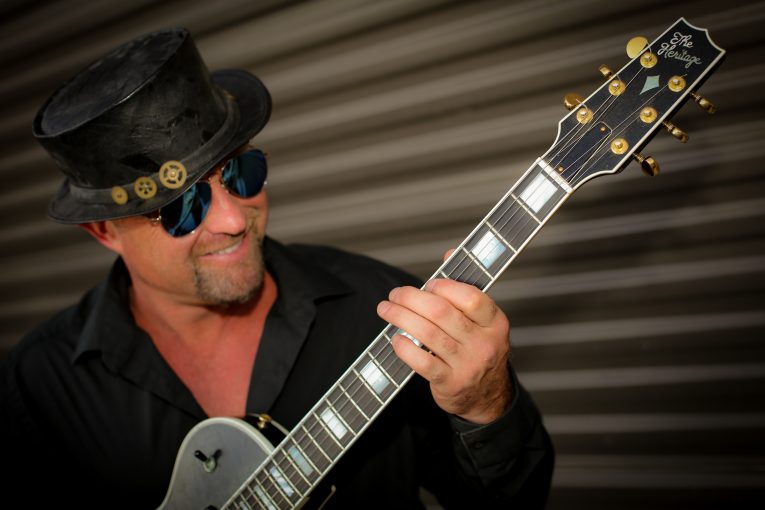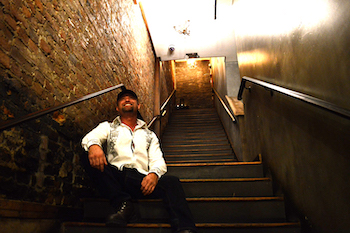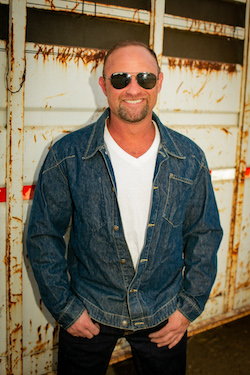
Photo: Rhiannon Brundage
By Kevin Porter
Critically acclaimed guitarist, singer-songwriter, Shane Dwight is considered an “ace songwriter” by USA Today and he’s back with a terrific new album, No One Who Loves Me Better out on Red Parlor Records. It mixes country, blues, rock and soul and features an all-star cast of musicians. Dwight’s lyrics paint vivid pictures of love, betrayal, temptation, failure and redemption. Besides No One Who Loves Me Better, Shane Dwight also has released eight albums and an unreleased country album, The Risk. He has so many unreleased songs—around 100 by one count—that he is even considering going back into the studio later this year.
Shane Dwight has headlined and performed at some of the biggest music festivals around the world and has performed with some of the biggest names in music including B.B. King, Los Lobos, Los Lonely Boys, Night Ranger, The Marshal Tucker Band, Johnny Winter, Etta James, Jimmie Vaughan, The Doobie Brothers and more.
Dwight grew up on a ranch in Morgan Hill, California. He splits his time between Nashville and California, and he was kind enough to talk to us by phone from California.
Kevin Porter: Thanks for talking to me. This is an exciting time. You have a new album out, No One Loves Me Better. What goals did you have in making this particular record?
Shane Dwight: We just wanted to make good music. We didn’t really think about genre or popularity, as much as we just thought of constructing things that mean something to us. Originality was important to us. We used a lot of different tunings that we came up with by accident. We created something that we hope sounds original and brings in the roots of where I came from, which is blues and country and Americana music.
KP: I should confess up front I’m not a guitar player, so I didn’t necessarily notice the different tunings when I listened to the tracks. What were a couple of songs where you did some alternative tunings?
SD: “Bullets & Gasoline,” “She Likes to Ride,” “Trial of Poets,” and “White Powder” are good examples. A really identifiable one would be “She Likes to Ride” because that riff really could not be played without an alternative tuning. My writer wasn’t as proficient on the guitar as I am and he was tuning his guitar in certain ways that were pretty abstract. We ended up using a couple different tunings. It was interesting and fun and provided for a deeper sound.
KP: I want to ask you about some of the songs. The one that really grabbed me was the last one – “The Trial of the Poet.” My understanding is that’s about your old guitar teacher.
SD: Yeah, it sure is. His name was John Garcia. I lived in kind of a ranch community outside of the Bay Area, and John was a guitar teacher. I studied with him for years, and then he became a member of my band. John was a mentor and a friend and just a great part of my life. He passed away a few years ago and that song was born out of him passing away and going to heaven, and you know the story of a bluesman passing away and going up there and hoping he did everything right before he got there.
KP: Another song that grabbed me was a song called “Sucker.” One lyric in the song that caught my attention: “The girl that drives fast but doesn’t get a ticket.”
SD: Yeah. There’s some truth to that. I am a sucker for a pretty girl. And, pretty women know how to use their wiles to get out of tickets and what not. I guess the song was just born out of some of the bad relationships I had that left me jaded. The song is about a guy going into a bar and meeting a girl and sort of asking for TMI from the girl. My favorite line is, “Don’t get offended. I’ve got tricked by a little witch. I stepped up to her and got my ass whipped. I went down like a chump. I went down. She had my heart on a leash. She drug it around till she left me for another boy. A rich fat boy with a bunch of toys.” It was born out of some truth, but it’s got some humor in it. I think there’s a lot of people who can relate to it.
KP: Let’s talk about the title song, “No One Loves Me Better.” You’ve got the lyrics up on your website. It strikes me as a fun, lighthearted love song.
SD: It very much is a lighthearted love song. That one came up when my co-writer, Derek Alldredge, had this little ditty in his head while he was driving to my house to write, and I just took it and ran with it as I often do with his ideas and he with mine. It’s kind of the hopefulness at the beginning of a relationship and the hopefulness at the end of a relationship. I think it kind of bookends it a little bit – there’s always hope going in, and hopefully, there’s hope going out.
KP: But, in between, it doesn’t sound too hopeful.
SD: Yeah, I’ve chased some rabbits down some holes. There’s still a lot of my music coming from a time when I was swimming through a pretty dark time for five or six years from divorce and betrayals by friends, family and girlfriends, and what not, and I just had to sift through it, so some of those songs were a carryover from that time period It’s kind of mean and dark but it’s not where I am at these days – I’m pretty happy and blessed.

KP: When you write songs, do you bring in the lyrics and your co-writer works on the riffs, or is it the other way around, or does it vary?
SD: Generally, when I’m writing, the music and the lyrics all happen simultaneously. I don’t know where it comes from. It’s just comes. I don’t really censor myself as to genre. When I’m songwriting, I don’t say, “Well, let’s make sure it’s a 12-bar blues.” It doesn’t come out like that. When Derek and I write songs, he’ll come up with the riff, or I might come up with the riff. I can’t tell you how many times I’ve been walking around the house noodling, and he’ll go, “What’s that? Record that!” And, I don’t know what I just did. “Well do it again.” Or vice versa, he’ll be playing something, and we’ll grab up a phone instantly and start recording. I’ll start spitting lyrics or he will. We just kind of build it from there.
KP: Well, it’s impressive; you can do both lyrics and music. When I ask people this question, I usually get, “Well, whatever just comes to my mind, I jot it down and match it up later.” I never heard someone who does both music and lyrics simultaneously.
SD: Yeah, to be honest, that’s how it comes. Like a lyric will come with a riff I start playing and the melody may be just one little phrase – like “You Ain’t the Devil,” for instance. I started playing that riff. And I remember specifically with that song Derek said: “What’s that?” “I don’t know, I was just noodling around.” And he just kind of bobbed his head while I was playing and went: “You ain’t the devil.” And I went: “I don’t know Jesus.” And there it was. That’s how that song was born and we just of fashioned lyric after lyric, and then we wrote the bridge. But, yeah, a lot of times, a riff or phrase will come out of the air, and we start constructing.
KP: It sounds like it’s not as much of a struggle for you as I think it is for other musicians. It sounds like it just flows out of you.
SD: I think it’s like anything. It does come from somewhere I can’t explain, and I am very thankful. I think that it’s like anything, you get better at it as you keep doing it – like shooting baskets. Whatever you are trying to accomplish, the more you do it, the easier it becomes. The last few years I’ve spent a lot of time doing it, and each one comes a little easier. There are songs that you sit on for years and go: “Wait, how come I can’t land this plane,” you know. I took one of the best pieces of advice that I’ve ever read – I love Stephen King’s writing and what’s so great about him is how prolific he is. And someone asked him one time: “How do you write? How are you so prolific?” And he goes: “I finish it. I just finish it. And then I start writing something else.” I think there’s a lot of wisdom in that.
KP: Tell me more about this more traditional country album, The Risk. How did that come about? You mentioned you had these songs and you recorded them in a couple of weeks.
SD: It’s a full record that I haven’t released yet. I had met Derek Alldredge and Derek had every making of being a huge country popstar—he’s got the looks, he’s got the sound, he’s from Alabama, he’s got the natural Southern drawl, he sings great. I fashion myself as a writer, and not much of an artist, and I thought, how about writing songs for him. He and I and two other writers had a bag of songs together, and I decided to record them. Interestingly enough, I think it is some of the best singing I have ever done because Derek is so good, I was pushing myself as a singer. I really was inspired – we were kind of throwing punches at each other in a way. I was stepping up my game as a singer, and he was stepping up his game as a guitar player.
KP: It’s impressive how prolific you are. You’ve got No One Loves Me Better. You’ve got this country album in the can. I understand that at your shows, you sell a blues record (High Time You Got Mine) you did with Kid Andersen at his Greaseland studios.
SD: Yeah, I just went in, and we just recorded it live. I listened to the songs a few days before, and it’s traditional blues covers and then one I wrote called: “High Time I Got Mine” that’s kind of in the style of Sonny Boy Williamson. It’s upright bass, piano, harmonica, and guitar. I’ve got a bunch I haven’t recorded yet. I’ve talked to Kevin about going back in probably later on in the year to follow up No One Loves Me Better because we’re sitting on a pile.
KP: Yeah, I understand you wrote over 100 songs.

SD: Yeah, we’re sitting on, between The Risk and this one, about 20-30 on those, and there’s a couple we didn’t record, so yeah. We’ve got about at least another 30-50 that just are waiting to be picked apart. It’s getting to be where we can’t remember them all.
KP: You’re touring, right?
SD: We’ve got quite a bit of shows coming up, and we’re adding more and more. We’ve got a nice set of shows in place this summer and leading into the fall and spring of next year—we should be really busy.
KP: Is this going to be a nationwide tour or more regional?
SD: Probably the regions I do a lot of—West Coast, Florida, Canada. I have a bone disease that makes it not as comfortable to be the road warrior like I used to be.
KP: How do you manage – I don’t if manage is the right word, but how do you “manage” your bone disease?
SD: I’m not into pain pills or anything like that. Sobriety is a priority for me right now. Trying not to go down that road – you know, Ibuprofen and not overdoing it. That’s the managing side of it right now. It’s going to take a good year or two for hip reconstruction. But, now is not the time. But in the next two years, I’ve got to think seriously about it.
KP: Reconstruction, what’s involved? Is it like a hip replacement?
SD: Yeah, it’s called Perthes Disease, and it destroys your hip sockets because of lack of circulation and the bones grow back wrong. There are different people who say reconstruction or hip replacement, but it’s about finding the right doctor and the right time.
KP: Do you try to limit your touring to a few shows at time and then taking a break in-between before doing a few more shows?
SD: Yeah, I try not to overdo it. The shows don’t bother it as much as the traveling and the lack of sleep. That wears it out more than anything. I’ll go weeks without my condition bothering me at all and then for no rhyme or reason, it will start driving me crazy. I just have to manage it and not overdo it.
KP: We’ve already talked a little bit about what’s next for you – some touring and you may go back into the studio later in the year to whittle away at this growing treasure trove of songs you have. Is there anything else that you’d like our readers to know?
SD: Just stay tuned. When this new record gets out there, take a listen to it. Hopefully, it will find something in here that you’ll enjoy and hopefully it will give people something to chew on for a little bit while we prepare for the next climb. I really am just looking forward to settling into Nashville in terms of being a songwriter and hopefully offer up these songs and my songwriting to other artists. That’s really a mountain that I want to climb. That’s the one thing that I’m looking forward to, anyway.
KP: I’ve always envisioned Nashville as having a lot of professional songwriters that write songs for other people to record. Do you see yourself going down that road?
SD: Yeah, that was part of The Risk. Ironically, that’s why I called it The Risk. I love writing songs. I love writing songs for myself; I love writing songs for other people. I appreciate singers who are just specialists – that’s all they do, and they really sing their hearts out. I would love to write songs for other people.
KP: Shane, I’ve taken a lot of your time, but this was a wonderful conversation. Is there anything else that you would like our readers to know that I didn’t ask you about?
SD: If you’re out there, give this record a good try. I’ve said this to a few people, I think it’s one of those records that you have to give it a few spins. Go through it a few times. It’s kind of dense, and it’s not pop, so it’s something that’s going to take a few minutes, but I hope it finds a place in people’s hearts.
KP: Thanks a lot, and enjoy the rest of your day. Congrats on the album.
SD: You as well. Thanks for taking the time. Thank everybody at Rock and Blues Muse for including us. We appreciate it.
For more information on Shane Dwight:

Leave A Comment